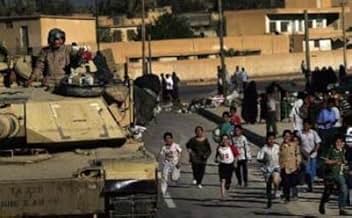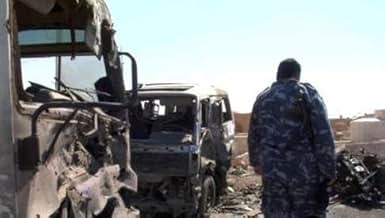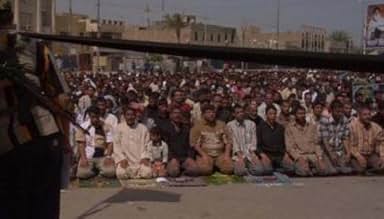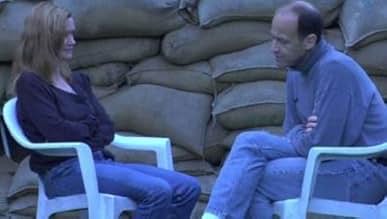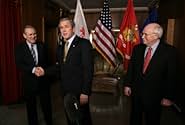IMDb RATING
8.2/10
8.8K
YOUR RATING
A comprehensive look at the Bush Administration's conduct of the Iraq war and its occupation of the country.A comprehensive look at the Bush Administration's conduct of the Iraq war and its occupation of the country.A comprehensive look at the Bush Administration's conduct of the Iraq war and its occupation of the country.
- Nominated for 1 Oscar
- 12 wins & 19 nominations total
Campbell Scott
- Narrator
- (voice)
George Tenet
- Self
- (archive footage)
Dick Cheney
- Self
- (archive footage)
Donald Rumsfeld
- Self
- (archive footage)
Paul Wolfowitz
- Self
- (archive footage)
Colin Powell
- Self
- (archive footage)
Feisal Istrabadi
- Self
- (as Faisal Al-Istrabadi)
Ahmad Chalabi
- Self
- (archive footage)
- Director
- Writer
- All cast & crew
- Production, box office & more at IMDbPro
Featured reviews
10sdv30-1
This is a movie every American must see. Tens of thousands of Iraqis killed, thousands of brave American soldiers killed or maimed, all for no apparent reason than the arrogance of this administration. Many good people, administrators, military etc. speak out in this movie and give a chilling view of the ineptitude and arrogance of George Bush and co. Unfortunately, these people were not consulted in the beginning of the occupation. Instead, they were pushed aside, as clueless and even malevolent bureaucrats, such as Bremmer, Holcombe, Wolfowitz, Rice, Rumsfeld, Cheney and Bush, mangled every aspect of the American occupation, one after the other, causing in the process an unimaginable loss of human life and resources. The movie's creators do not impose their beliefs on you. Instead, they let the testimonies of the people who were there speak for themselves. The conclusion that comes out of it is inescapable. This has been the largest quagmire in American history, the true cost of which will not be known for decades. It truly is a nightmare with no end in sight.
Sometimes seeing a documentary that has such immense and complex connotations like the war on Iraq can be so staggering that one might be tempted to rate it highly just based on how compelling the subject matter is. That part of it, of whether it's worthy for a documentary, is important. But first-time director Ferguson does an incredible job of amounting crucial interviews with former Generals and government officials, ex-soldiers, enough footage of Iraq destruction for two or more movies, and a mounting sense of dread over the unequivocal fiasco that what went on leading up to-during-and especially after America invaded Iraq, and the film was more than worthy of a special jury prize at Sundance earlier this year.
It's devastating and infuriating enough to get the people you might be with seeing the film into a heated argument (probably with everyone on the side, at least, that it was profoundly stupid to go into the country to start with, without a real plan anyway), because of the layers that can be taken into account. If one watched the news enough, or read what was available at the time, then some of the information may not be all new-news. But a lot of it is, which throws on fuel to the fire for Ferguson's thesis that with all the mounting mistakes, the most crucial ones came in taking for granted what would happen if say, for example, the Iraqi army was disbanded along with the Ba'ath party (if that's how it's spelled). Interestingly, Ferguson doesn't spend too much time on the blunder that was going into Iraq in the first place; that's for other films and he knows it well (namely Fahrenheit 9/11).
We went in. Now 'what to do next' is really where the cards are all layed out: the looting and rioting, which went on for days and ruined many of Iraq's small places of civilization like museums and libraries (which, of course, Rumsfeld and the US didn't mind and practically encouraged), then after that the whole huge f*** up that was the lack of real planning for after we toppled Sadaam's regime (for Germany after WW2 the plan was layed out two years in advance, for Iraq it started 50 days before the invasion), and very notably Walter B. Slocombe (who comes off stumbling through his interview as he can't answer why he wasn't talking to other advisers about the plans of what to do with the Iraq security) and L Paul Bremer, who crafted the three plans for reconstituting Iraq, which basically created the Insurgency. That part, of course, is a big chunk of No End in Sight, with the blunders continuing on and gaining force with the US involvement in Iraq.
So the question comes first to those thinking about the questions Ferguson lays out through his interview, aside from how in the living hell (literally, if you're over in Iraq) we've now spend two *trillion* dollars over there, which is: Why? To get a documentary like that now probably would make a big enough uproar to get people in the streets. But for now, No End in Sight will have to do.
It's devastating and infuriating enough to get the people you might be with seeing the film into a heated argument (probably with everyone on the side, at least, that it was profoundly stupid to go into the country to start with, without a real plan anyway), because of the layers that can be taken into account. If one watched the news enough, or read what was available at the time, then some of the information may not be all new-news. But a lot of it is, which throws on fuel to the fire for Ferguson's thesis that with all the mounting mistakes, the most crucial ones came in taking for granted what would happen if say, for example, the Iraqi army was disbanded along with the Ba'ath party (if that's how it's spelled). Interestingly, Ferguson doesn't spend too much time on the blunder that was going into Iraq in the first place; that's for other films and he knows it well (namely Fahrenheit 9/11).
We went in. Now 'what to do next' is really where the cards are all layed out: the looting and rioting, which went on for days and ruined many of Iraq's small places of civilization like museums and libraries (which, of course, Rumsfeld and the US didn't mind and practically encouraged), then after that the whole huge f*** up that was the lack of real planning for after we toppled Sadaam's regime (for Germany after WW2 the plan was layed out two years in advance, for Iraq it started 50 days before the invasion), and very notably Walter B. Slocombe (who comes off stumbling through his interview as he can't answer why he wasn't talking to other advisers about the plans of what to do with the Iraq security) and L Paul Bremer, who crafted the three plans for reconstituting Iraq, which basically created the Insurgency. That part, of course, is a big chunk of No End in Sight, with the blunders continuing on and gaining force with the US involvement in Iraq.
So the question comes first to those thinking about the questions Ferguson lays out through his interview, aside from how in the living hell (literally, if you're over in Iraq) we've now spend two *trillion* dollars over there, which is: Why? To get a documentary like that now probably would make a big enough uproar to get people in the streets. But for now, No End in Sight will have to do.
10Tamarast
As a military brat, I wanted to see if it was the military or the Cabinet that was making poor decisions about the Iraqi invasion and the years of occupation. Charles Ferguson presented a well laid out chronological story from 9/11/2001 (the Pentagon scenes were especially tearful, we forget that was hit by a plane as well) to the present. Especially interesting was the history between Iran and Iraqi, and I remember the day in 1979 when we knew of American military families that had to leave in the middle of the night from Tehran. America's backing of Hussein then caught up with us in the 90's. Bush's administration was looking for a connection - WMDs, Al-Qada, something.
I was impressed with the candor of Richard Armitage, Col Paul Hughes, and even with Walter Slocombe. The interviews were interesting, honest, and true.
Last week I watched "Saving Private Ryan" for the first time, and understood that we sent in 350,000 troops to Normandy during and after D-Day. Our ability to have that kind of troop deployment is over, as is the Cold War. Instead we are creating a ticking time bomb (much like we did in backing Hussein against Khomeini in 1980) that I hope will not create instability world wide.
I'm planning on buying multiple copies of this DVD - it is that important, not only for now, but in campaign issues in the next year.
I was impressed with the candor of Richard Armitage, Col Paul Hughes, and even with Walter Slocombe. The interviews were interesting, honest, and true.
Last week I watched "Saving Private Ryan" for the first time, and understood that we sent in 350,000 troops to Normandy during and after D-Day. Our ability to have that kind of troop deployment is over, as is the Cold War. Instead we are creating a ticking time bomb (much like we did in backing Hussein against Khomeini in 1980) that I hope will not create instability world wide.
I'm planning on buying multiple copies of this DVD - it is that important, not only for now, but in campaign issues in the next year.
You may think that Charles Ferguson's documentary is filled with things we already know. That's what I thought. But the truth of the matter is I knew it like a rumor of sorts born and nurtured out of anger and frustration. What this riveting documentary does is to show it to us confirming what we thought we knew.The sadness is unbearable. The clarity of what lays at the center of this absurdity is startling, devastating. There were only five people in the theater. Why? I found out about the existence of "No End In Sight" through a radio interview with the film-maker. The film has been released practically in secrecy. Everyone is flocking to see Chuck and Larry while this masterpiece that concern us directly is practically ignored. I want to thank Charles Ferguson for this enormous contribution to the truth. I believe he put his own livelihood on the line for the privilege. Sir, you've just become a hero of mine.
This is an amazing conformation of the Bush administrations utter failure in the handling of the Iraq war. A girl scoot troop could have made better and more informed decisions. Perhaps even a troop of monkeys would have done a better job then Bush's henchmen?
The errors in judgment and lack of military experience within the administration are both appalling and telling of the Bush white house. Every military expert was systematically ignored or sidelined. It's as if the Bush administration's primary and sole interest or concern was the protection and acquisition of Iraq's oil provisions.
This film is a testament to the complete and absolute failure of the Bush presidency.
The errors in judgment and lack of military experience within the administration are both appalling and telling of the Bush white house. Every military expert was systematically ignored or sidelined. It's as if the Bush administration's primary and sole interest or concern was the protection and acquisition of Iraq's oil provisions.
This film is a testament to the complete and absolute failure of the Bush presidency.
Did you know
- TriviaMarine Lieutenant Seth Moulton was elected the US Congressman for Massachusetts' 6th District in November 2014.
- Quotes
Seth Moulton: Are you telling me that's the best America can do?... No, don't tell me that... That makes me angry.
Everything New on HBO Max in September
Everything New on HBO Max in September
We're excited for "Task," a new crime series from the creator of "Mare of Easttown." See everything else coming to HBO Max this month.
- How long is No End in Sight?Powered by Alexa
Details
Box office
- Budget
- $2,000,000 (estimated)
- Gross US & Canada
- $1,433,319
- Opening weekend US & Canada
- $31,533
- Jul 29, 2007
- Gross worldwide
- $1,433,319
- Runtime
- 1h 42m(102 min)
- Color
- Sound mix
- Aspect ratio
- 1.85 : 1
Contribute to this page
Suggest an edit or add missing content


